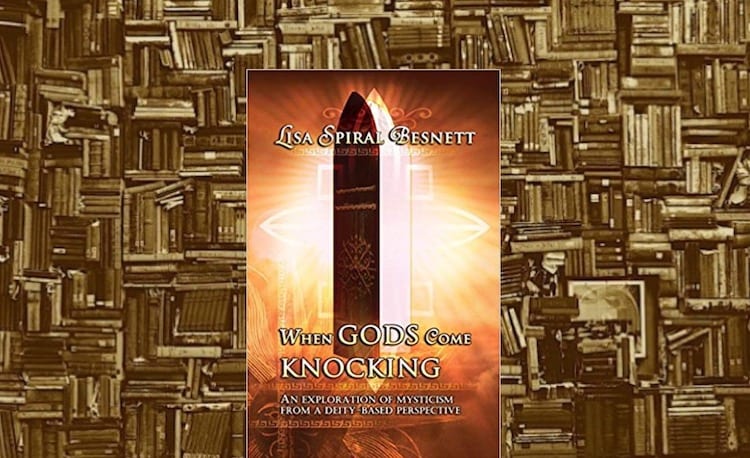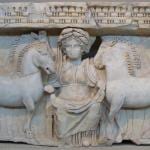Many Pagans seek direct experience of their gods, but not every divine experience is initiated by the seeker. Sometimes, the gods come knocking for reasons of their own. It is stories of those experiences which Lisa Spiral Besnett has collected in When Gods Come Knocking (2014, Megalithica Books), but while a collection of such tales might be interesting in and of itself, Besnett takes it up a notch. She provides context to the reader via her many years of experience as a priest and teacher, using vivid metaphors to help the reader recognize the signs of a divine calling, and presenting options for how to respond.
What do I mean by “vivid metaphor?” Here’s an example: Besnett’s tea pot doesn’t have a whistle, she explains, and she has learned to notice other signs that the water is about to boil, such as the sound of the water or the temperature of the handle. She then relates this back to divine contact, writing, “Most people expect a whistle, or a doorbell or a lightning strike. Just like the whistle on the teapot, those are good ways to know when the deity is knocking. The divine doesn’t always use a whistle, or a doorbell or a lightning strike. Sometimes the divine just knocks.” The author is well aware that interacting with the unseen defies language, yet she finds words like these which bring it home.
Names of gods are perhaps the most slippery language of all, and Besnett tackles that confusion head on, recalling that others who have had experience of her patron goddess seem to be on a very different trip: “Even though some of these people refer to their deity as Mab, I don’t recognize her. . . . I do not presume to say that I am right or they are wrong. How many Johns do you know? The name itself is not enough to identify my lady.” The names we choose will certainly shape our relationship with the divine, but the gods themselves are not so easily pigeonholed, she suggests. Better to find the different relationships remarkable, than to take umbrage or be distressed over how another person treats your deity. Is it actually the same being? Do our physical understandings of individuality even apply?
Also included are many attempts to eff the ineffable. As with any mystery, these by definition must always fall short, because mystery and words never quite mix. As with all of humanity, we nevertheless make the attempt, and I believe we are better for it. What might seem like ramblings to one reader could strike a familiar chord in another, resonating with that reader’s recollection of an indescribable experience.
Here’s an example:
The experiences described in this book, whether with Kali or Jesus or the ancestors or an unnamed force, are largely experiences of people who choose to live in accordance with that divine call. The result is what author Kirk White might call being an adept, those wise ones who have very little need for magic because their entire lives are acting in accordance with their will, or that of their gods. These powerful relationships manifest as a life of serenity in the midst of chaos, of level-headed planning, and of inner peace. That’s the result of near-constant communion with deity, listening to spirit as well as sound, and largely living in a worshipful state.
On the other hand, while it is surely an honor to be called into service by the gods, Besnett is quite clear that it is always okay to say “no” to the offer. This is a powerful idea. Some people have a hard time saying no in general, and can get used up or burned out quickly by helping others in their time of need. How much more taxing it can be to have many gods asking for one’s time and efforts, if one never declines any of those requests! There is more than one example of someone telling a god “no” in this book, and I appreciate those stories of spiritual people exercising discernment.
I was initially skeptical that the author could tackle this subject without inadvertently twisting it with her own biases. With careful reading, I came away believing that, while not perfect, this book does so much better than I thought possible. These 134 pages are an enlightening sampling of what uninvited divine contact might look like, and what to do when it happens.
Quibbles: While it’s true that one can accept or decline an invitation from a god — and terribly important that this truth be acknowledged in writing — it might have been instructive to hear from more people who regretted whichever choice they made. Human nature is riddled with “what if” thinking, and more of that would have somewhat sated my curiosity.
Title: When Gods Come Knocking
Author: Lisa Spiral Besnet
Publisher: Megalithica Books
ISBN: 978-1-905714-93-3


















